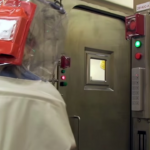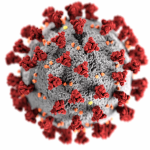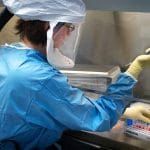The Russian disinformation attack that poses a biological danger
By Filippa Lentzos | November 19, 2018
 Image: Jared Rodriguez / Truthout via Creative Commons.
Image: Jared Rodriguez / Truthout via Creative Commons.
In a series of increasingly confrontational statements, Russia has suggested that the Pentagon is establishing a chain of bio-weapons labs on its borders. At the heart of the accusations is the Richard Lugar Center for Public Health Research in the Republic of Georgia. Named after US Senator Richard Lugar, who initiated the renovation of lab networks in former Soviet states, the Lugar Center became operational in 2013. It has the first high-containment laboratory in the region that meets Biosafety Level 3 standards, meaning it is equipped to study serious or lethal human diseases, and it serves Georgia and the wider region with detection and diagnostic capacity for disease outbreaks.
The Russian charges that the Lugar Center and other biological labs in the Caucasus and Central Asia are making banned bioweapons are unfounded. Last week a group of international experts, including this author, visited the Lugar Center by invitation of the Georgian government. We were given access to all areas of the site, examined relevant documentation, and interviewed staff, and concluded that the Center demonstrates significant transparency. Our group observed nothing out of the ordinary, or that we wouldn’t expect to see in a legitimate facility of this sort.
The Russian allegations appear to be part of a disinformation campaign that has grown in response to scrutiny of Moscow for using and enabling the use of chemical weapons. It is also likely that part of Russia’s goal is to discredit Western influence in former Soviet states by spreading fear and dividing public opinion. The charges are probably aimed at a domestic audience as well, as a biological weapons threat on Russia’s doorstep could motivate military investments to counter it.
To be sure, Russia and before it the Soviet Union have perpetrated many disinformation campaigns with the deliberate goal of sowing confusion and mistrust, including interference in the US 2016 presidential election. The current claims about the Georgia lab are not even Moscow’s first disinformation campaign about supposed US biological agents. In the 1980s, KGB agents disseminated the nonsense claim that the US government had invented the AIDS virus in a lab, as a new documentary from the New York Times reports.
Disinformation attacks bring with them many dangers. Beyond sowing distrust and political dissent, they can prime a population for physical conflict, and in the case of Georgia, Russia may even be trying to justify future military interference with its neighbor. False claims about biological weapons in particular, though, create an additional grave danger: They erode the international norm against using them, making countries more likely to do so. While it is easy to dismiss the Russian messaging as nonsense, as the US Embassy in Georgia has done, it is important to actively counter the effect it will likely have on the norm against using biological weapons.
An intensifying, multi-channel attack. Stories about supposed US bioweapon labs in neighboring countries, and in particular about the Lugar Center, have circulated for a number of years in the Russian media. Indeed, Russia’s official national security strategy identifies the network of public health laboratories in the Caucasus and Central Asia funded by the US Defense Department as a strategic threat. That said, messaging about the Lugar Center significantly ramped up after Britain identified Russia as the perpetrator of a botched March 2018 murder attempt in Salisbury, England using the nerve agent novichok. (Russian agents tried to kill former Russian spy Sergei Skripal and his daughter Yulia, without success, but ended up inadvertently killing an English civilian.) In early April, embattled Syrian dictator Bashar al-Assad, who Russia supports militarily, attacked civilians in Douma with chlorine gas.
In April, within weeks of Britain pinpointing the Russian state as culpable for the Salisbury attack, and a day after Trump threatened Russia with US missile strikes on Syria in response to the Douma attack, Russian foreign ministry spokeswoman Maria Zakharova questioned the “real goals” of the American “chain of microbiological laboratories” in former Soviet states and of “the Pentagon’s large-scale medical-biological activities near Russian borders.” After British counter-terrorism police presented findings from six months of evidence-gathering on the Skripal case, and issued domestic and European arrest warrants for two Russian suspects on September 4, the accusations drastically intensified.
Within a week, Igor Giorgadze, a former Georgian state security minister who now resides in Russia, launched a heavily publicized campaign in the Russian media against the Lugar Center. In a news briefing from Moscow on September 11, he claimed he had thousands of pages of secret documents indicating that US Defense Department biologists and private contractors at the Lugar Center may be engaged in illegal medical experiments on the Georgian people, and that the facility could be a cover for a biological weapons lab. “These documents need to be reviewed and evaluated by experts,” Giorgadze said in an open letter, and called on the US president and Congress to investigate the laboratory’s activities. Giorgadze created a website containing an initial batch of documents to support his allegations; he claims more documents are forthcoming. (Links in Russian.)
The Russian Ministry of Defense said it was analyzing Giorgadze’s documents, and according to Sputnik News, claimed on September 14 that they point to serious violations of the Biological Weapons Convention (BWC). Commenting on Giorgadze’s statement, Vladimir Yermakov, director of the Department for Non-Proliferation and Arms Control at the Russian Foreign Ministry, told media that Russia will not allow biological experiments to be carried out “on its borders” by the Americans. (Link in Russian.)
A day after Giorgadze’s news briefing, Bulgarian investigative journalist Dilyana Gaytandzhieva, who has previously accused the Pentagon of setting up bioweapons labs in the Caucuses and Central Asia, published an article on her website that seemed to corroborate Giorgadze’s claims about secret and illegal medical experiments at the Lugar lab. The story was picked up in the Russian media. It was also broadcast on Al Mayadeen, a satellite television channel viewed as pro-Assad and pro-Hezbollah, and on Zvezda, a television network run by the Russian Ministry of Defense, as the debunking project Myth Detector reports. A systematic study of social media posts with the words “biological weapon” and “in Georgia” over the past year indicates a significant peak in October 2018, underscoring how the messaging was intensifying.
Georgia responded to Russia’s claims in a September 27 memo circulated to the Geneva missions of states party to the BWC. It highlighted that the Lugar Center is an open civilian institution under the auspices of the National Center for Disease Control and Public Health of Georgia. The memo maintained that Georgia complies with the Convention, and that, as a further voluntary transparency measure, it had invited international experts and observers from treaty states to visit the facility on November 14 and 15 to see for themselves.
Meanwhile the BBC was investigating Giorgadze’s claims about “secret” documents, and on November 12 broadcast the results. Giorgadze said the documents he released showed the lab had experimented on Georgian citizens with non-clinically approved drugs. In fact, the BBC found, while the documents were real, they only showed evidence of an above-board program to treat Hepatitis C with drugs that are used and approved worldwide, including by the United States and World Health Organization.
Nevertheless, Russia’s messaging has only become more aggressive over the course of the fall. In early October, the head of Russian special forces for nuclear, biological, and chemical protection, Major-General Igor Kirillov, claimed that the Lugar lab is part of a larger US effort to build up its military-biological potential and gain control of national collections of dangerous pathogens. Russia views this as a direct security threat. Going a step further, the chair of the Russian parliament’s committee on defense, Colonel-General Vladimir Shamanov, threatened that “Russia will take diplomatic and military measures in response to the deployment of the large-scale US military-biological program in states bordering the Russian Federation, in particular Georgia.” (Links in Russian.)
In Geneva, Russia circulated a reply memo on October 10 to BWC states party missions, claiming the Georgian side was attempting to create “a distorted image” of the Lugar Center. It noted that the lab was built by the Pentagon, that the United States covers the laboratory’s operating costs including its security, and that Americans finance dual-use research conducted there. Somewhat ironically, considering the vast, ostensibly civilian, network of public health laboratories that concealed the Soviet offensive biological weapons program, the memo goes on to claim that, “in order to conceal the true character and mission of this facility it has been formally incorporated into Georgia’s public health system.” Georgia’s goal in inviting BWC states to visit, the Russian memo claims, is “to create an illusion of legitimacy and transparency,” and Russia does “not see any value in participating in such a politically biased event.”
When the UN General Assembly committee on disarmament and international security met this fall for its annual four-week deliberations in New York, the diplomatic exchanges between Georgian and Russian representatives turned hostile. Before that happened, the Syrian representative, likely with Russian encouragement, on several ocasions insinuated or outright accused Georgia of hosting secret US biological laboratories in violation of the BWC. In a prepared statement on October 30, Elene Agladze, the deputy permanent representative of Georgia to the United Nations, said:
“Our empirical experience has shown that although absurd, Russian allegations have been not just a propaganda tool, but lately even part of hybrid warfare in terms of laying a political groundwork for future aggressive actions. Therefore, statements that Russia will not tolerate bio experiments along its border should be considered as a direct threat to Georgian security … These observations reflect the trend not only in Georgia, but in nearby areas. I recall the wide-scale military build-up in the temporarily occupied Crimea and the city of Sevastopol, as well as the Sea of Azov, which has grave regional security implications and clearly manifest that we are not talking about isolated cases here, but of the wider pattern of Russian aggressive policy towards its neighbors.”
In an impromptu reply, the deputy head of the Russian delegation, Andrey Belousov, again threw doubt on Georgia’s transparency initiatives, and questioned the research carried out at the Lugar lab, saying: “Georgia has already admitted that yes, indeed, these labs are carrying out experiments, including on people. The statistics are such that in one experiment, on a very dangerous disease, more than 9,000 volunteers were involved, and as a result of this experiment around 10 percent of these volunteers died.” The Georgian representative’s response to these allegations focused on the timing of the propaganda. She said internationally recognized Russian experts had visited the Lugar Center on a number of occasions over the last few years to check the facility for themselves, but hadn’t found anything suspicious. “So why this issue is being raised right now is very questionable,” she said.
Open lines of communication. Russia’s repeated and coordinated insinuations and unsupported allegations about American-sponsored secret labs are alarming—even beyond the fact that they could have very real consequences for stability in the Caucasus and Central Asia. Until now, the international norm against biological weapons has been very strong. It is enshrined in the BWC, which completely prohibits biological weapons. Agreed in 1972, the BWC is still gaining membership—in the last two years, seven new states have joined, bringing total membership to 182. The international community most recently reaffirmed the norm by consensus at the United Nations General Assembly on November 5. Such regular reaffirmations are important, particularly against the background of hostile diplomatic exchanges. Global support for the BWC suggests that the vast majority of nations see biological weapons as taboo. By claiming that biological weapon labs exist where they do not, Russia is hastening the death of that taboo—creating the appearance that reliance on these weapons is greater than it actually is, possibly encouraging other nations to pursue them.
Georgia’s diplomatic pushback and active transparency efforts are important steps in the right direction too. But other governments and members of the global academic and science communities should also take steps to counteract the damage being caused by Moscow’s false claims. Specifically, they should work to maintain current lines of communication with counterparts in Russia, as well as open up new ones. Creating opportunities for informal dialogue between Russian and Western government representatives, biosecurity experts, and the next generation is essential. Links between Russian and Western scientific and technical institutions, as well as personal relationships fostered through joint projects and scientist exchanges, build confidence that prohibited activities are not taking place.
While such cooperation is difficult, it is not impossible. In the early post-Cold War days, American and Russian scientists cooperated to keep nuclear weapons safe and secure. In the bio-weapons realm, trail blazer virologist Jens Kuhn negotiated access in 2001 to work in the heart of the former Soviet bioweapons establishment, the first Western scientist to do so. From 1991 to 2015, the American Defense Threat Reduction Agency ran a cooperative biological engagement program with Russia. While that may have run its course, there could now be opportunities for other actors to step in. An increasing number of BWC states are, like Georgia, inviting experts from other countries to visit their high containment facilities with the aim of strengthening transparency and building confidence between peers. These visits could be designed to politically enable Russia to participate. At a stretch, perhaps Russia could be persuaded to host one itself, as a means to start technical discussions on agreed standards for the sort of transparency visits it has regularly criticized. There is contemporary precedent for this sort of thing: The World Health Organization carries out safety inspections at Russia’s maximum-security smallpox repository in Novosibirsk every two years.
Over the years, international efforts to devalue biological weapons as a military option have been substantial and in many ways successful. Russia, as one of the BWC’s three depositary states along with the United States and Britain, should take special care of the treaty and the taboo against bioweapons. If it is genuinely concerned about a bioweapons threat from Georgia, it should use existing BWC mechanisms to raise the issue, rather than circulate insinuations and unfounded allegations that only damage the treaty. With Moscow actively undermining the established norm through its disinformation campaign, it is up to the international community to actively push back.
Together, we make the world safer.
The Bulletin elevates expert voices above the noise. But as an independent nonprofit organization, our operations depend on the support of readers like you. Help us continue to deliver quality journalism that holds leaders accountable. Your support of our work at any level is important. In return, we promise our coverage will be understandable, influential, vigilant, solution-oriented, and fair-minded. Together we can make a difference.
Topics: Biosecurity














